The Magic Box

Brief Synopsis
Cast & Crew
John Boulting
Robert Donat
Margaret Johnston
Maria Schell
Richard Attenborough
Renee Asherson
Film Details
Technical Specs
Synopsis
Now old, ill, poor, and largely forgotten, William Freise-Greene was once very different. As young and handsome William Green he changed his name to include his first wife's so that it sounded more impressive for the photographic portrait work he was so good at. But he was also an inventor and his search for a way to project moving pictures became an obsession that ultimately changed the life of all those he loved.
Director
John Boulting
Cast

Robert Donat
Margaret Johnston

Maria Schell

Richard Attenborough
Renee Asherson

Robert Beatty

Edward Chapman

Maurice Colbourne
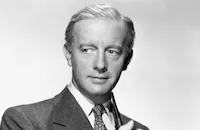
Roland Culver
Michael Denison
John Howard Davies
Joan Dowling
Henry Edwards
Mary Ellis
Marjorie Fielding
Robert Flemyng
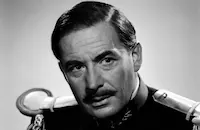
Leo Genn

Marius Goring
Everley Gregg

Joyce Grenfell
Robertson Hare

Kathleen Harrison

William Hartnell
Joan Hickson

Thora Hird

Stanley Holloway
Patrick Holt
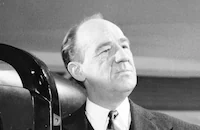
Michael Hordern
Jack Hulbert
Sidney James

Glynis Johns

Mervyn Johns
Barry Jones
Ann Lancaster

Bessie Love
Miles Malleson
Muir Mathieson
A. E. Matthews

Bernard Miles

Laurence Olivier

Cecil Parker

Frank Pettingell

Eric Portman

Dennis Price

Michael Redgrave

Margaret Rutherford

Janette Scott
Ronald Shiner

Sheila Sim
John Stuart
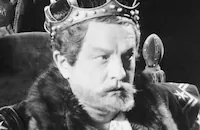
Basil Sydney

Ernest Thesiger
Sybil Thorndike

David Tomlinson
Cecil Trouncer

Peter Ustinov
Charles Victor
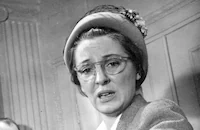
Kay Walsh
Emlyn Williams

Googie Withers
Charles Victor
Videos
Movie Clip



Film Details
Technical Specs
Articles
The Magic Box
Friese-Greene remains an intriguing figure, though, and The Magic Box - a 1952 biopic directed by John Boulting - gives a sympathetic account of his life and work, which included many sad failures along with occasional brief triumphs. The screenplay, written by the prolific Eric Ambler, is based on Ray Allister's biography "Friese-Greene: Close-Up of an Inventor," which generated some fuss in the movie world by arguing in favor of Friese-Greene's claim to greatness. The Magic Box was made as a showcase to represent the British film industry at the Festival of Britain in 1951, which happened to be the thirtieth anniversary of Friese-Greene's death, and its festival credentials helped producer Ronald Neame assemble one of the most illustrious supporting casts in movie history. The story doesn't dig very far into Friese-Greene's history, leaving out (among other things) his work on the biophantascope, a sort of rapid-fire slide-show gizmo; his experiments with 3-D in the 1890s; and a prison stretch he served for borrowing money while bankrupt. But the tale has plenty of interest nonetheless.
The straightforward plot of The Magic Box is worked into a slightly complicated flashback structure. We first meet Friese-Greene as a worn-down man in his mid-sixties, on his way to a convention of the British movie industry in 1921. Paying a quick visit to his estranged wife, Edith, he shows her two small film cans holding his latest experiments with Biocolour, a process that promises to outdo the reigning Kinemacolour system. This time his new process works, he tells Edith, and she listens patiently. The story then leaps back to 1897, where we find Friese-Greene working on X-ray technology. Here he admits that his real name is William Green - a moniker not high-toned enough for an up-and-coming photographer, he says, explaining why he added the last name of his first wife (Friese) and tacked on an extra "e" at the end. Years pass, he remarries, and his family grows. His inventions take up more and more of his meager income, straining the family's budget so badly that the kids can't afford tickets for the train that takes them to school, forcing them to sneak aboard and then hop off before it reaches the station. In a particularly poignant scene, one of his young sons comes home from school after a fight that started when another boy showed him an encyclopedia article about cinema where his father's name wasn't mentioned. The boys all join the army when World War I begins, easing the household's financial woes, but it's clear that the family doesn't have much of a future.
After a brief scene showing Friese-Greene's arrival at the industry conference in 1921, we flash farther back to the earliest phase of his career, when his new ideas infuriate the stodgy photographer he works for. In the studio he meets Helena Friese, who spurs his imagination by showing him a flip-book she has drawn. The years of their marriage bring ups and downs galore. At first they're desperately poor; then Willy becomes a hugely successful portrait photographer; then his business partner walks out because he spends too much time on his experiments; and finally he assembles the working motion-picture camera he's dreamed of for so long. After filming some images in Hyde Park, he works feverishly to develop the film and project it on a sheet hanging from the wall. Then he races outdoors, snags the only person he can find in the middle of the night - a police constable - and shows his movie to the cop, whose suspicions give way to amazement and admiration. Friese-Greene's hopes for financial success meet with bitter disappointment, though, and when Helena is diagnosed with a fatal heart condition, she tears up her prescriptions so she can give Willy a prism for his birthday. The final scene shows Friese-Greene speaking up at the 1921 convention, using his last breaths to advocate change and adventurousness in the motion-picture industry.
A film about filmmaking needs to have first-rate technical values, and The Magic Box doesn't disappoint. Its most striking asset is the superb Technicolor camerawork by master cinematographer Jack Cardiff, whose expressive deep-focus compositions and nuanced use of color are a treat for the eyes in almost every scene, perfectly complementing Boulting's efficient storytelling style. The cast is uniformly excellent as well. Robert Donat gives a subtle yet forceful performance as Friese-Greene, conveying the inventor's dignity, passion, and eccentricity without a hint of showboating or overacting. The other standout is the fine Viennese actress Maria Schell as the Swiss-born Helena, a beautiful woman beautifully played. And then there's the extraordinary supporting lineup. In his autobiography, Straight from the Horse's Mouth, producer Neame wrote that it was challenging to gather big names for cameo parts with very little pay, but when Laurence Olivier agreed to play the policeman in the climactic scene - a small role, but an important one - others quickly fell into line. Among them are Richard Attenborough as Friese-Greene's young assistant; Eric Portman as Friese-Greene's business partner; Joyce Grenfell as a choir singer; Marius Goring as a creditors' agent; Peter Ustinov and Michael Redgrave as men at the motion-picture conference; Margaret Rutherford, Sybil Thorndike, and Googie Withers as portrait sitters; Ernest Thesiger as a minor nobleman; Emlyn Williams as a banker; Muir Mathieson, the renowned musical director and orchestra conductor for this film, as Sir Arthur Sullivan, the celebrated composer; and many more.
Many reviewers liked The Magic Box when it opened commercially in 1952. Variety called it "a picture of great sincerity and integrity, superbly acted and intelligently directed," while Cinema in Britain deemed it "often amusing, sometimes moving and only occasionally dull." Critics singled out Olivier's performance for special praise, with Britain Today calling his scene "brilliant" and "unselfish, with one of the greatest actors of our time deliberately serving as a 'feed' in the interests of the story." The reviewer for the London Daily Express concurred, writing that Olivier and Donat together "milk the big moment of more tenseness and eye-moistening emotion than you would have thought possible." Bosley Crowther of The New York Times said the film was "full of the most exquisite vignettes of Victorian England and Victorian ways," although it wasn't "historic" enough to rise above "pathos and sentiment." He also called it a touching look at "the dreams and frustrations of a man who misses the boat in every endeavor and turns into a sort of pitiful old crank," but that overstates the case. While Friese-Greene was surely challenging to live or work with, The Magic Box makes him very good company on the screen.
Director: John Boulting
Producer: Ronald Neame
Screenplay: Eric Ambler
Cinematographer: Jack Cardiff
Film Editing: Richard Best
Production Design: John Bryan
Art Direction: T. Hopewell-Ash
Music: William Alwyn
With: Robert Donat (William Friese-Greene), Margaret Johnston (Edith Friese-Greene), Maria Schell (Helena Friese-Greene), Renee Asherson (Miss Tagg), Richard Attenborough (Jack Carter), Robert Beatty (Lord Beaverbrook), Martin Boddey (portrait sitter at Bath), Edward Chapman (family-portrait father), John Charlesworth (Graham Friese-Greene), Maurice Colbourne (wedding-portrait father), Roland Culver (company promoter), John Howard Davies (Maurice Friese-Greene), Michael Denison (reporter), Joan Dowling (Maggie), Henry Edwards (butler), Mary Ellis (Mrs. Nell Collings), Marjorie Fielding (viscountess), Robert Flemyng (physician), Leo Genn (physician at Maida Vale), Marius Goring (creditors' agent), Everley Gregg (wedding-portrait mother), Joyce Grenfell (Mrs. Claire), Robertson Hare (portrait sitter at Bath), Kathleen Harrison (family-portrait mother), William Hartnell (army recruiter), Joan Hickson (Mrs. Stukely), Thora Hird (housekeeper), Stanley Holloway (broker's man), Patrick Holt (portrait sitter at Bath), Michael Hordern (receiver), Jack Hulbert (Holborn policeman), Sid James (storeroom sergeant), Glynis Johns (May Jones), Mervyn Johns (Goitz), Barry Jones (physician at Bath), Peter Jones (man at industry meeting), James Kenney (Kenneth Friese-Greene), Ann Lancaster (wedding-portrait bridesmaid), Herbert Lomas (warehouse manager), John Longden (speaker at industry meeting), Bessie Love (wedding-portrait mother), Miles Malleson (orchestra conductor), Garry Marsh (company promoter), Muir Mathieson (Sir Arthur Sullivan), A.E. Matthews (gentleman), Bernard Miles (Cousin Alfred), Richard Murdoch (portrait sitter at Bath), John McCallum (portrait sitter at Bath), David Oake (Claude Friese-Greene), Laurence Olivier (police constable), Cecil Parker (man at industry meeting), Frank Pettingell (wedding-portrait father), Norman Pierce (speaker at industry meeting), Eric Portman (Arthur Collings), Dennis Price (Harold), Michael Redgrave (Mr. Lege), Peter Reynolds (wedding-portrait groom), Margaret Rutherford (Lady Pond), Janette Scott (Ethel Friese-Greene), Ronald Shiner (barker), Sheila Sim (nursemaid), Oda Slobodskaya (concert soloist), John Stuart (man at industry meeting), Marianne Stone (wedding-portrait bride), Basil Sydney (William Fox Talbot), Ernest Thesiger (earl), Sybil Thorndike (portrait sitter at Bath), David Tomlinson (lab assistant), Cecil Trouncer (John Rudge), Michael Trubshawe (portrait sitter at Bath), Peter Ustinov (man at industry meeting), Frederick Valk (Maurice Guttenburg), Amy Veness (wedding-portrait grandmother), Charles Victor (man at industry meeting), Kay Walsh (receptionist), Norman Watson (physician at industry meeting), Emlyn Williams (bank manager), Harcourt Williams (Tom), Googie Withers (portrait sitter at Bath), Joan Young (woman in glove shop).
C-108m. Closed Captioning.
by David Sterritt

The Magic Box
Quotes
Trivia
Miscellaneous Notes
Released in United States 1951
Released in United States November 1998
Released in United States 1951
Shown at London Film Festival November 5-19, 1998.
A biopic of the life of movie camera pioneer William Friese-Greene, chock full of cameo appearances by notable British actors, including Laurence Olivier as a startled policeman who sees one of the first moving pictures.
Released in United States November 1998 (Shown at London Film Festival November 5-19, 1998.)













